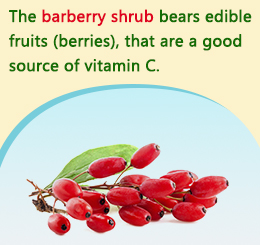The alkaloid berberine present in the root, bark, and fruit of the barberry shrub has displayed antiviral, antibacterial, and antifungal properties in various studies. This Buzzle article elaborates more on some probable health benefits of barberry.

Did You Know?
In Europe, the fruits of the barberry shrub are commonly used to make jam and jelly.The European barberry, or simply barberry (
Berberis vulgaris), refers to the species of shrubs in the genus Berberis. The thorny shrub, that is up to 4 meters tall, bears edible fruits (berries) known for their acidic taste. Indigenous to central and southern Europe, the species is primarily cultivated in many places for its fruits. The shrub is said to have high medicinal value, and its extracts containing fruit, bark, and roots of the shrub are considered a traditional remedy for various ailments. The following are the purported health benefits of the barberry herb.
Boosts Immunity
Well, you may like barberry berries for their pleasant acidic flavor, but from a heath standpoint, consuming them is actually a very good idea. This is because, the berries contain a great deal of vitamin C, the nutrient that plays a crucial role in strengthening immunity and combating infections. So, to make the immune system function better, having these berries is a good option.
Helps Ease Infections
Antibacterial
Berberine, an alkaloid found in barberry, demonstrates both antibacterial and antifungal properties, as observed in test tube, animal, and human studies. So, taking the dried root, bark, or herbal extracts may be useful in treating urinary tract infections, that are often caused by E. coli strains of bacteria.
Antifungal
With berberine having demonstrated the ability to suppress growth of various Candida species, the berberine-containing barberry may help treat fungal infections such as candidiasis. So, yeast infections of the skin may respond to the use of barberry extracts.
Antiviral
Berberine has shown antiviral activity in vivo and vitro studies, particularly against the influenza virus. This means, taking extracts of barberry may help in alleviating viral infections that cause chest congestion, runny nose, sore throat, and lung problems like bronchitis.
Anti-diarrheal
Berberine, found in barberry, also displays anti-diarrheal activity, which means, barberry may work to treat various diarrheal diseases. Diarrhea is commonly caused by bacteria and protozoa (parasites) As berberine has shown to be effective against these infectious agents, taking barberry may help relieve diarrhea.
Good for Digestive Health
Barberry may help enhance digestive function by increasing the secretion of digestive enzymes and stomach acid. The herb not only alleviates digestion problems, but also increases the appetite. It may also assist in resolving the symptoms of a stomach upset.
Anti-inflammatory
Quite a few studies have also revealed the anti-inflammatory properties of berberine. So, people suffering from inflammatory skin conditions such as psoriasis and acne may benefits from the use of barberry extracts. Inflammatory conditions of the respiratory tract such as bronchitis and sinusitis can also be treated with these extracts.
Supports Liver Health
This herb is said to be good for the liver, as it facilitates the secretion of bile. Its traditional use as a liver tonic is well-known, as it is believed to promote the detoxification of the liver. In short, the herb is said to support liver health, and may also be used to treat gallbladder problems.
Anti-diabetic
The alkaloid berberine in barberry acts like an anti-diabetic drug, as it has shown to reduce high blood sugar in people affected with diabetes mellitus. Moreover, the efficacy of berberine is on par with metformin, the first line of treatment in controlling high blood sugar. So, adding barberry to the diet may help in regulating blood sugar as well as control diabetes.
Lowers Blood Pressure
High blood pressure patients may benefit from including barberry in their diet, as the alkaloid berberine has shown to reduce blood pressure, as found through animal studies. Berberine tends to dilate the blood vessels, which helps lower high blood pressure. This, in turn, may reduce the risk of heart problems associated with high blood pressure.
Relieves Arthritic Pain
Berbamine, another alkaloid found in the barberry herb, has also shown anti-inflammatory activity in vitro studies. Hence, its extracts may help in treating inflammatory conditions of the joints, such as gout and arthritis.
Other Uses
Preliminary research also indicates that berbamine displays a tumor-inhibiting, antipyretic, and anti-arrhythmic effect. Hence, taking these extracts may benefit in treating heart palpitations, fever, and some forms of cancer.
Usage
Barberry extracts are often sold in the form of supplements (capsules) and tincture. Its root powder is commonly used to make barberry root tea, which is often taken to get rid of various infections (including those that affect the bladder, eyes, and the nails). Drinking this tea can also help destroy parasites that often cause abdominal pain. Topical creams containing extracts of barberry can be used to treat skin problems. People affected with first- and second-degree burns are at increased risk of infections. An easy way to minimize this risk is to regularly apply these creams.
A point to note here is that, the aforementioned benefits are of berberine that is extracted from the plant, and then studied. In short, berberine in isolation, has been researched on, and as such, studies on barberry as a whole are very limited with inconclusive results. Moreover, though research on berberine has been encouraging, there are no long-term studies to evaluate the safety of the supplement. So, whether you decide to take barberry extract or berberine supplements, make sure you contact your health care provider and discuss the same beforehand.
Disclaimer: The information provided in this article is solely for educating the reader. It is not intended to be a substitute for the advice of a medical expert.






